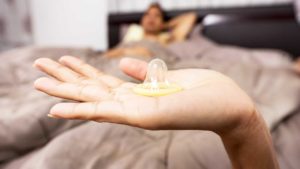I remember asking this question myself.
It is a vital fact to know, especially if things are getting hot and heavy in the romance and relationship department and you decide to give the knob job a whirl.
I know you know what I am talking about.
We like to be REAL here at The Parenting Co.
A number of us have been there (how do you think my first daughter came along?).
You are with a partner or someone who isn’t techincally your partner. Or, you haven’t foreseen anything happening, but then a crazy kind of connection starts to happen.
You think to yourself…
‘Damn it. I don’t have any contraception’.
You ask the other person if they have brought any along. Alas, they haven’t. And you decide to give it a whirl anyway. You agree to have the man ‘pull out’. And then you think to yourself, ‘I hope I don’t get pregnant. Can you get pregnant from precum?’
Many of us don’t know the answer to this question, so today we are going to break it down for you. You are super fertile at different stages of the month—a lot to think about in the heat of the moment. So let us take all of the confusion out of it for you with everything you need to know about precum.
Table of Contents
DISCLAIMER: Having unprotected sex can result in STDs, and no contraception is 100-percent foolproof.
But first of all:
What is Precum?
It is generally clear and odourless, and most men and women barely notice that it is there. Men do not have any control over the secretion of precum. If you have ever seen a man’s genitals during foreplay or before intercourse takes place, the clear fluid around the tip of his penis is the precum.
Precum has an essential job to do. It prepares the penis for ejaculation by lubricating the urethra (the little pipe inside of the penis that transports the semen). The more lubricated or slimy the urethra, the easier it is for sperm to travel out of a man’s body. Precum released from a man’s penis also helps to lubricate a woman’s vagina during sex.
But as necessary as this fluid is, it can also contain some sneaky little sperm that can be the cause of you becoming pregnant. One particular study found that out of 27 men, 41 percent of them had sperm in their precum because it may pick up some leftover sperm from an earlier ejaculation.
If sperms are present, you are fertile, and your body conditions are right, you can become pregnant.

When Does Precum Occur?
Precum is also known as pre-ejaculate fluid. Pretty self-explanatory. Precum is the fluid released from a man’s penis during sexual stimulation and before the big O or ejaculation or cumming.
Precum starts to seep out during sexual arousal or when a man gets ‘turned on’. It will come out when a man’s penis is erect.
NOTE: A man can be erect and aroused without sexual intercourse or activity.
It means that precum can already be present before sexual activity or penetration occurs, and it will continue during sexual activity and penetration because its job is to lubricate.
Can You Get Pregnant from Precum?
Yep. Yep. You sure can.
Although the chances are slim, there is a possibility that you can get pregnant from precum, especially if the factors and timing are right. There are times in a menstrual cycle that a woman is more likely to get pregnant.
People don’t often realize this, but there are a number of factors that need to come together in order for a woman to conceive and become pregnant.
Let’s take a look at these factors:
When Am I Most Likely to Get Pregnant?
You are most likely to become pregnant when you are ovulating and the period leading up to ovulation.
What is the Ovulation Period?
Many people don’t realize that there is a time or phase during a woman’s menstrual cycle where it is possible for her to get pregnant. The ovulation period also called the ‘fertility window’, is the phase in which a woman is at her most fertile and pregnancy is possible.
The fertility window is the day that you ovulate (release your egg) and the five days leading up to that. Ovulation happens once in a woman’s menstrual cycle. It usually occurs around 12 to 16 days before your next period, although this can be different for some people. Your body is a fantastic thing. You have certain hormones that will trigger your ovaries to release an egg.
Many women will have some discomfort or pain during this time of their menstrual cycle. I know that I am ovulating when I get a dull ache and pains about two weeks before my period (menstrual bleeding) starts.
If you don’t know your ovulation period, there are ways that you can predict or calculate your ovulation period and fertility window.
Now, we are going to look at the likelihood of becoming pregnant at different stages of your menstrual cycle.
Precum During Ovulation and Fertility Window
FACT: Your egg is viable (able to be fertilized) for up to 24 hours after release. Having sex after the egg is no longer ready for reproduction reduces your risk of pregnancy to zero.
Although your egg is only viable for about a day, sperm can live for up to a week inside of you in the right conditions. So even if you have had sex a few days before you ovulate, you can have a sperm sneaking its way to your egg as it reaches your fallopian tube.
The chances of conception (becoming pregnant) during ovulation and the fertility window differ depending on your age, your body’s condition, and your method of contraception. But for our purposes, here are some average figures.
Likelihood Of Becoming Pregnant During Ovulation And Fertility Window
Sex 5 days before ovulation = 10 percent
Sex 2 days before the day of ovulation = 30 percent
Precum Outside of the Ovulation Period
Becoming pregnant outside of this period reduces the chances of pregnancy to almost zero. This period is six or more days before ovulation and after the egg is no longer viable. It is a pretty big window, but as we said before, sperm can live inside of your body for a number of days.
It is best to play it safe; use protection if you do not want to become pregnant.
The chances of pregnancy lessen the further away the sex occurs before ovulation.
It is safest to use this method straight after the egg is no longer viable, which is 24 hours after ovulation.

How to Deal with Precum
There are plenty of myths about dealing with precum if it does enter the vagina. Let’s have a look at these and discuss some of the smartest ways to deal with precum:
1. Cover it up with a condom.
This is the best way to prevent STDs. It also aids in preventing pregnancy. Condoms are effective by up to 95 percent if used correctly.
2. Use contraception and birth control.
If you have heard it once, you’ve heard it a thousand and one times. Although pulling out (which we will discuss here) is a form of birth control, it is not a very effective one. Look into other forms of contraception and birth control to reduce your risk of pregnancy.
3. Get to know your fertility window and ovulation period.
You are most fertile during this stage, so you can avoid having any semen in, on, or around your vagina at this time.
4. Only use the pull-out method with a trusted partner and if you are sure you can support the process.
Seriously, if you do not want to become pregnant, we wouldn’t advise using the pull-out method during your fertility window at all. But as discussed, this method takes a tremendous amount of self-control and trust and leaves a lot to chance.
Let’s have a look at this now.
What is Pulling Out?
Pulling out is alternatively known as withdrawal or coitus interuptus.
Coitus – sexual intercourse
Interruptus – disturb
Although pulling out is a better form of contraception than using nothing at all, it is still a pretty poor method of contraception. I say poor because there is a lot of room for human error and this method leaves a lot of elements to chance for it to work.
Pulling out is where a man’s penis is removed from your vagina before he ejaculates (cums).
The reasoning behind this is that no semen will enter the vagina. However, a small amount of semen can be present in precum. Thus, it is advised to use other methods of contraception (such as a ring, the pill, IUD, or a condom) in order for the pull-out method to be effective.
And let’s face it: if you are using other methods of contraception, then you don’t have to pull out. Although it keeps semen out of the vagina as much as possible, it does not decrease the chances of getting pregnant because it still has its failure margins.
How Effective is Pulling Out?
For every 100 women who use the pull-out or withdrawal method PERFECTLY, four will still get pregnant.
Did you notice the work PERFECTLY? Although it can be an effective method of contraception, it is not the best method if your primary purpose is not to get pregnant. We are not sure what the figures are for women who use the method IMPERFECTLY. But it is safe to say it is more than four in every 100.
And let’s face it: it takes a fair bit of control to get this method perfect.
In the throes of passion, sometimes you can lose your mind a bit (or is that just me)? You have to trust your partner to pull out and trust yourself to encourage that to happen. My friend MF gave a perfect quote to describe the flaws associated with this method:
‘We didn’t have a condom, so we decided that he would pull out. But it felt really good, and when he said, ‘I am going to cum, I need to pull out soon’, I changed my mind, held him close, and told him to come inside of me. So he did. The result? Twins.’
What are the Downsides to the Pull-Out Method?
The pull-out method or withdrawal method gets a pretty bad knock as a method of contraception, and here is why:
- Both parties must have a shit load of control.
- You must know precisely when the semen is coming out of the penis and pull out BEFORE then.
- Semen may also be present in precum, so although you may pull out before reaching orgasm, a small amount of semen may still enter your vagina.
- It does not prevent sexually transmitted disease or infection.
- For it to work best, you must ejaculate away from the area of the vagina (timing and proximity, people).
Can You Get Pregnant Without Penetration?
Once again, this is very unlikely, but it is possible in theory.
Pregnancy occurs when a man’s sperm fertilizes an egg. We have established that sperm can be present in the precum (pre-ejaculate fluid) and the semen (ejaculate fluid).
You can get pregnant without penetration in the following circumstances:
- Sperm gets inside your vagina; for example, you may get sperm on your fingers and then touch your vagina (sperm can only live for a short time outside of the body, so the possibility is very low).
- A man may ejaculate near your vagina or get precum near your vagina.
- A man may rub his penis on your vagina or in the very inside of your vagina, and you get sperm on the inside of your vagina lips.
Getting pregnant this way is less likely than if you were to experience penetration, but your best bet for avoiding it outright is to use contraception.
Myths and Facts
A number of pregnancies have been reported to be the result of precum. Many of the women who claim they got pregnant from precum have ‘pulled and prayed’ (used the pull-out method).
Some may be due to not using this method correctly as it may be hard for a man to withdraw when he needs to, and some may have been from precum because it can contain sperm.
And if the time of sexual activity and the fertility window come together, it can result in a baby.
Let’s face it: there are plenty of myths going around about pregnancy, and it can be hard to separate fact from fiction. We have included a few of the myths and facts below to make it easier.
Pregnancy can be hard and, at the very least, confusing. Let’s keep it as easy as possible, people!
MYTH: Flushing or douching precum (or semen) out of your vagina will prevent pregnancy.
FACT: Flushing or douching precum (or semen) out of your vagina may push the sperm further and help the sperm reach the egg faster.
MYTH: Standing up or jumping up and down will drain the sperm from my vagina, and I won’t get pregnant.
FACT: The only way to reduce the likelihood of getting pregnant is by using birth control. No amount of standing up or jumping up and down will reduce the possibility of pregnancy.
MYTH: Conception occurs on the same day that you have sex.
FACT: Conception can occur on the same day or up to a few days after you have sex because sperm can live for a few days inside of your body, waiting for the egg to arrive in your fallopian tubes.
So there you go ladies, hope I clarified some of the confusion you have in mind. Remember: Protection is the #1 contraception. Not a chance.







